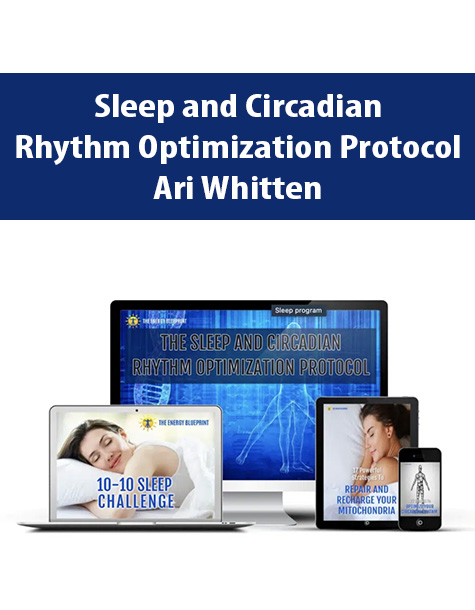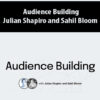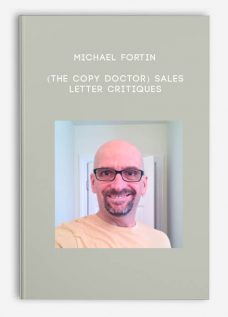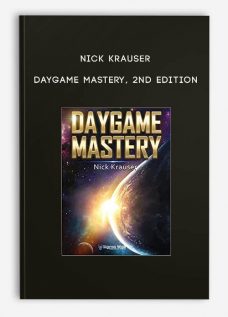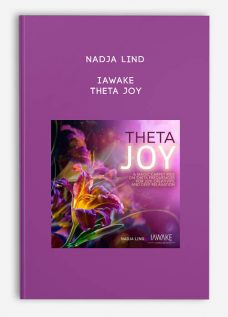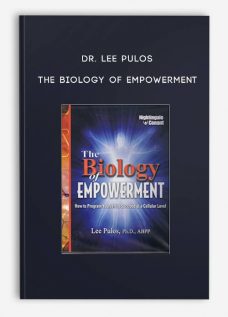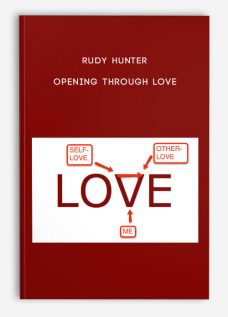Sleep and Circadian Rhythm Optimization Protocol By Ari Whitten
Original price was: $97.00.$32.00Current price is: $32.00.
File size: 1.78 GB
Media Type: Online Course
Delivery Time: 1-12 hours.
Content proof: Watch here!
- Description
Description
Sleep and Circadian Rhythm Optimization Protocol By Ari Whitten – Instant download!
| Do You Know The Single Biggest Cause Of Most Sleep (And Energy) Struggles? It’s a dysfunctional biological clock in your brain (a.k.a. your “Circadian Rhythm”)
Welcome To The Most Powerful System Ever Developed For Fixing Your Sleep and Energy Struggles — The Sleep and Circadian Rhythm Optimization Protocol |
Take A Look At The Results People Are Getting With This Program
What Is Your Circadian Rhythm? Your circadian rhythm is literally a 24-hour clock built into your brain, and it’s a major controller of dozens of hormones and neurotransmitters that control everything from your sleep to your energy levels, to your brain function, and even how fat or lean you are.
And if you want to have amazing deep sleep and all-day energy, you NEED to know how to optimize your circadian rhythm. Maybe you already KNOW your issue is sleep. Or perhaps you’ve “tried everything”… But you’re still struggling with your health and energy… Here’s the good news: Your CIRCADIAN RHYTHM (your body’s biological clock) is your hidden path to health. And there are solutions! Here are 5 Vitally Important Facts to Support You. Fact #1: Optimizing Your Circadian Rhythm Is The Biggest Secret of Health, Energy, and Sleep Optimization And almost no one is talking about the keys to optimizing circadian rhythm. I’ve spent over 10 years digging through over 6,000 studies on circadian rhythm science, and I’ve developed the most advanced scientific BLUEPRINT for optimizing your circadian rhythm in existence. What Optimizing Your Circadian Rhythm With This System Does For You:
This isn’t some insomnia gimmick – some new device claimed to fix your sleep that doesn’t actually work. Nor is this just some sleeping pill, which seems like a good solution at first, but then you later find out that it stops working, and causes a whole bunch of nasty side effects. This is literally the most advanced scientific protocol for sleep and circadian rhythm enhancement ever developed. It is the science-proven path to rewiring your biology for deep sleep and amazing energy levels. FACT #2 – The Single Biggest Cause Of Poor Sleep Is Disrupted Circadian Rhythm. And Almost EVERYONE Has A Dysfunctional Circadian Rhythm! To simplify:
THE MODERN WORLD IS FUNDAMENTALLY NOT ALIGNED WITH OUR BIOLOGY, AND IS MESSING UP OUR BRAIN’S CIRCADIAN RHYTHM The answer: Because the modern world we live in is fundamentally mismatched to the signals our biology – and our circadian rhythm in particular – is designed for. See, humans are designed for an outdoor existence in tune with the rise and fall of the sun. We’re not designed to be indoors almost all day, and then to be staring at all sorts of artificial light sources after the sun sets. Simply put: Virtually all of us in modern society are suffering from one degree or another of circadian rhythm disruption. In short… We’re not getting enough of a Daytime/Energy Mode signal into our circadian clock in our brain during the daytime (when we should be getting it) We’re getting way too much of a Daytime/Energy Mode signal at night (when we shouldn’t be getting it).
This may seem to be a trivial difference to you. But what if I told you that it is the difference between normal vs. abnormal levels of dozens of hormones and neurotransmitters that affect everything from your mood, to your metabolism, to how fat or lean you are, to clearing toxins out of your brain and body, to ridding the body of DNA-damaged cells (critical for preventing cancer), to your sleep, to your energy levels? Would you still think it was trivial? In fact, that is precisely what our circadian rhythm does. The problem is so widespread that Harvard doctors recently published an article called “The Dark Side of Blue Light” where they talked about how the modern world is chronically disrupting our circadian rhythms. Here’s a nice summary from researcher George Brainard, PhD:
Most people are sleeping 1-4 hours less than is optimal for health and energy. But there’s an even bigger problem: The QUALITY of the sleep has taken a huge hit. Did you know that living with sleep deprivation, even for a short time, can have brutal effects on your physical and mental health? Consider this:
Chronic, low-level sleep deprivation of not sleeping 1-4 hours as long as your body really needs is an epidemic. But believe it or not, there’s something even worse going on… … it’s not just the number of hours that have decreased, but the QUALITY of the sleep during those hours has also take a massive hit. Why? Because of how the modern world causes our body’s biological clock (our “circadian rhythm”) to dysfunction. It turns out that it’s not just the number of hours we sleep, but the QUALITY of the sleep during those hours. In other words, whether our brain can enter the phases of deep sleep that it needs for cellular regeneration. What controls that? Your circadian rhythm! The single biggest factor behind the modern epidemic of insomnia and poor sleep, is very simple: Poor circadian rhythm habits, and living in an environment that is fundamentally at odds with our circadian rhythm. Fact #3 – Dysfunction Of Our Circadian Rhythm Is The Single Biggest Cause Of Fatigue For People In The Modern World
Struggling with lack of energy during the day and poor sleep at night? It’s probably your circadian rhythm! It’s not just sleep that suffers when your circadian rhythm is chronically disrupted — your ENERGY during the day also takes a massive hit. This is because the circadian rhythm controls BOTH the hormones and neurotransmitters that control sleep at night AND the hormones and neurotransmitters that control wakefulness and ENERGY during the day. That’s the other side of the circadian rhythm. It controls what happens in your body during both the darkness period and the daytime (light) period of the 24-hour day. Basically, think of it like this… Sleep and energy are two sides of the same coin – and they are connected via the circadian rhythm. The circadian rhythm in your brain is designed to regulate neurotransmitters and hormones that impact BOTH how ENERGIZED you are during the day, AND how easily and deeply you sleep at night. Our bodies respond to visual cues in our environment, chiefly light and darkness, to release hormones and neurotransmitters that either power us up and awake for daytime or prepare us for sleep and repair.
As explained in this study titled “Life between Clocks: Daily Temporal Patterns of Human Chronotypes”: “Our results predict that the timing of sleep has changed during industrialization and that a majority of humans are sleep deprived during the workweek. The implications are far-ranging concerning learning, memory, vigilance, performance, and quality of life.”[1] But it’s not just hormones and neurotransmitters… Your circadian rhythm also directly influences your actual cellular energy generators (your MITOCHONDRIA) that provide that energy to virtually all the trillions of cells in your body. Melatonin is the most potent protector of your mitochondria. Most people know melatonin as a sleep-inducing hormone. And it is certainly that. But most people have absolutely no idea that melatonin is absolutely vital for mitochondrial function, protects mitochondria from damage, and is vital for mitochondrial regeneration while we sleep. There are a number of impressive – and little known – studies showing how vital it is for mitochondrial health that you produce LOTS of melatonin each night while you sleep. The melatonin we release that prepares us for sleep nourishes the mitochondria in numerous ways including:
And here’s the big problem: When you have poor circadian rhythm habits, you have less melatonin in your body that can get to the mitochondria. Too much blue light at night (and blunted circadian rhythm in general, from poor circadian rhythm habits) greatly inhibits melatonin release, which directly leads to grossly negative impacts upon mitochondrial dysfunction, causing mitochondrial fragility and die-off.[12][13][14] Over time, what that means is that mitochondria will accumulate more damage, will not function as well, and you will not rebuild new healthy mitochondria nearly as well. You’ll be slowly accumulating more and more damaged and defective mitochondria, and inevitably, you will end up fatigued. If we lose our mitochondria – or accumulate lots of weak and damaged mitochondria — we lose our health, energy, immunity, strength, and vitality as well. We age faster, we are far more susceptible to disease, and we end up chronically fatigued. In short, think of it like this: Optimal circadian rhythm means deep, restful sleep, good mood, peak mental and physical performance, good body composition, leanness and high energy levels. Disrupted circadian rhythm is the exact opposite. Sleep problems, insomnia, anxiety and depression. Poor brain performance, poor physical performance, tendency towards fat gain and chronic fatigue and energy problems.
FACT #4 – Disrupted Circadian Rhythm Slowly Eats Away At Your Brain — Dramatically Increasing Your Risk Of Depression, Anxiety And Even Brain Diseases Like Alzheimer’s And Dementia There are several key mechanisms at play here:
There are numerous confirmed mechanisms by which disrupted circadian rhythm directly impairs the function of our brain and even directly damages the cells of the brain. What does all of this ultimately mean for you?
In short, a disrupted circadian rhythm erodes away at your brain, impairing your mood, energy, quality of life, happiness, brain function for decades. And ultimately, dramatically increases your risk of brain diseases. Fact #5 – Disrupted Circadian Rhythm Accelerates Aging, And Leads To Increased Risk of Dozens of Diseases, Including Heart Disease, Diabetes and Cancer How does a chronically disrupted circadian rhythm affect us? Disrupted circadian rhythm has been shown to:
In short, when you don’t sleep enough and sleep deeply enough, your body and brain BREAK DOWN AND DYSFUNCTION, slowly eroding away at your quality of life. LET ME HELP! |
What You Get With The Sleep & Circadian Rhythm Optimization Protocol
|
||||||
| Trying to Health Hack Energy? Sleep and energy are two sides of the same coin – and they are connected via the circadian rhythm.AND FAST FIXES ARE MAKING IT WORSE!! CAFFEINE AND ENERGY DRINKS AND “HACKS”…When you force a fatigued body and dysfunctional mitochondria to pump out more energy (either through fiddling with neurotransmitters in the brain or causing the release of stress hormones), you PAY A PRICE FOR IT OVER TIME.You are putting already an already fatigued and overworked brain and mitochondria under even MORE DEMANDS. So the body and brain actually become MORE FATIGUED over time.If you’ve been struggling with insomnia, poor sleep quality, fatigue or low energy levels, it’s time to stop dragging yourself through the day with caffeine and stimulants…It’s time to reset your most powerful built-in tool, your circadian rhythm and start building REAL ENERGY.You can rebuild your internal antioxidant defense system! And make your cells regenerate faster while you sleep
What This System Does For You:
This is the most advanced circadian rhythm and sleep protocol ever developed. If you have been struggling with poor sleep and daytime sleepiness/fatigue, this is your ticket to a better life! |
What Kind Of Results Are People Getting With This System?
|
What’s in the program
|
| References [1] Roenneberg. T. et. al. (2003) Life between clocks: daily temporal patterns of human chronotypes.[2]Venkatramanujam, S. (2011). Melatonin in Mitochondrial Dysfunction and Related Disorders. International Journal of Alzheimer’s Disease.[3]Hardeland, R.,(2003). Oxidation of melatonin by carbonate radicals and chemiluminescence emitted during pyrrole ring cleavage. Journal of Pineal Research. 34(1):17-25.[4]Reiter RJ, et. al. (2003). Melatonin as an antioxidant: biochemical mechanisms and pathophysiological implications in humans. Acta Biochim Pol., 50(4):1129-46.[5] Hardeland R,. (1993). The significance of the metabolism of the neurohormone melatonin: antioxidative protection and formation of bioactive substances. Neuroscience and Biobehavioral Reviews. 17(3):347–357.[6]Hardeland R,. (1993). The significance of the metabolism of the neurohormone melatonin: antioxidative protection and formation of bioactive substances. Neuroscience and Biobehavioral Reviews. 17(3):347–357.[7]Hardeland R,. (1993). The significance of the metabolism of the neurohormone melatonin: antioxidative protection and formation of bioactive substances. Neuroscience and Biobehavioral Reviews. 17(3):347–357. [8]Leon, J, Acuña-Castroviejo, D., et. al. (2011). Melatonin and mitochondrial function. Current Topics in Medicinal Chemistry, 11: 221–240. [9] Castroviejo DA, et. al. (2011) Melatonin-mitochondria interplay in health and disease. Current Topics in Medicinal Chemistry. [10]Rodríguez, M.I., Escames, G., and L. C. López. (2008). Improved mitochondrial function and increased life span after chronic melatonin treatment in senescent prone ice. Experimental Gerontology. 43(8):749–756. [11] Venkatramanujam, S. (2011). Melatonin in Mitochondrial Dysfunction and Related Disorders. International Journal of Alzheimer’s Disease. [12]Andres, A. (2015). A time to reap, a time to sow: Mitophagy and biogenesis in cardiac pathophysiology. Journal of Molecular and Cellular Cardiology, 78: 62-72 [13]Ma, D. et. al. (2012). Circadian autophagy rhythm: a link between clock and metabolism? Trends in Endocrinology and Metabolism, 23: 319-325 [14]Godley, B. F. (2005). Blue light induces mitochondrial DNA damage and free radical production in epithelial cells. Journal of Biology and Chemistry, 280(22): 21061-6. [15]Medical News Today (2014) How can disrupting circadian rhythms contribute to inflammatory disease? [16]Cohen. S. et. al. (2009) Sleep habits and susceptibility to the common cold. [17]Shanmugam. V. et. al. (2013) Disruption of circadian rhythm increases the risk of cancer, metabolic syndrome and cardiovascular disease [18] Maury. E. et.al. (2010) Circadian Rhythms and Metabolic Syndrome [19] Obayashi, K. et. al. (2014) Light exposure at night is associated with subclinical carotid atherosclerosis in the general elderly population: The HEIJO-KYO cohort [20] International Journal of Endocrinology (2015) The Impact of Sleep and Circadian Disturbance on Hormones and Metabolism [21]Chepesiuk R., (2009) Missing the Dark: Health Effects of Light Pollution [22]Wulff, K. et. al. (2010) Sleep and circadian rhythm disruption in psychiatric and neurodegenerative disease. [23]Science Daily (2013) Sleep deprivation linked to aging skin, study suggest |
Sleep and Circadian Rhythm Optimization Protocol By Ari Whitten, what is it included (Content proof: Watch here!)Course Lesson
Bonus
|

